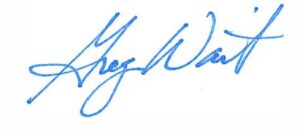This quarter, we are honored to present a special reflection letter penned by Greg Wait, as he marks his retirement after a distinguished investing career. His unwavering commitment to our clients and his passion for responsible investment have left a mark on our firm and the broader investment community. As Greg shares some of the wisdom he’s gained over the years, let’s take a moment to express our heartfelt gratitude for his incredible leadership and commitment to Riverwater.
Thanks for everything, Greg. We wish you all the best!
With some very large shoes to fill, Riverwater Partners has named Brian Gigl as our Director of Wealth Management. Feel free to contact Brian with any Wealth Management questions.
By Greg Wait:
Dear Clients and Friends,
I am about to enter retirement (whatever that means) after 40 years in the financial services industry. For this quarter’s letter, Adam asked me to share my reflections on things I’ve learned throughout my career. As I’ve thought about this, the song Turn The Page by Bob Seger came to mind. For those of you who know me well, it won’t surprise you that a song pops into my head when thinking about anything! Written in 1972, Bob writes about the ups and downs of a rock musician’s life on the road. While I haven’t been a rock musician (at least not yet), I can appreciate the sentiment about working in an industry that, by its very nature, experiences a very regular rollercoaster ride. I have worked hard to provide our clients with honest and steady advice, with a thought process that is somewhat outside of the mainstream, over all these years.
Here are some observations and final advice on financial markets:
- The stock market does not move in lock-step with the economy. This one comes as a huge surprise to most people.
- The outcome of political elections has essentially no impact on the intermediate to long-term returns in the financial markets.
- No single factor drives returns in the financial markets. This one is particularly important for investors to remember, as a lot of bad decisions have been made based on an emotional reaction to one statistic or news item. The markets are incredibly complex, so much so that not even the so-called experts can predict future returns with any consistency or accuracy.
- Portfolio diversification is a risk reduction tool, not necessarily a return enhancing tool.
- Active management can outperform passive (index) investing over long periods of time. However, it takes a prudent approach to evaluating active managers to achieve good risk-adjusted results. We’ve been able to demonstrate that over the past twenty years.
- Index investing can be more risky than actively managed investments, contrary to what is typically reported in the popular press. Active management is typically more effective in down markets.
- Integrating environmental, social and governance (ESG) criteria into a prudent investment process does not cause lower returns. Similarly, considering all stakeholders when managing a business does not produce worse financial results.
- Sustainable investing can have a powerful impact on society’s well-being. Charitable organizations are so important, but the power of private capital can truly make the world a better place.
- Here are some books I have recommended to clients over the years. A common theme is understanding different ways to look at various topics: The Tipping Point or Outliers by Malcolm Gladwell; Thinking, Fast and Slow by Daniel Kahneman; Originals by Adam Grant; The Deficit Myth by Stephanie Kelton; The Politics Industry by Katherine Gehl and Michael Porter.
- The best advice I’ve ever given to my clients is to stop watching cable news, including CNN, Fox News and MSNBC. Furthermore, I suggest turning off investment news channels, such as CNBC, Bloomberg, and CNN Business. Getting “news” (which, of course, is mostly commentary) from social media outlets is equally dangerous. We cannot live in the echo chamber of biased news sources that only reinforce what we already believe to be true, or that exist only for entertainment and commercial purposes. This is clearly the most difficult habit for people to break, and it can lead to bad investment decisions, and anger and depression. Try to rely on less biased journalism, which might include Reuters, BBC, and the Wall Street Journal (but be leery of the editorials). I love this sign that sits outside of my favorite bird food shop in Door County!











